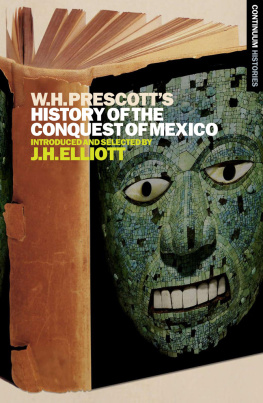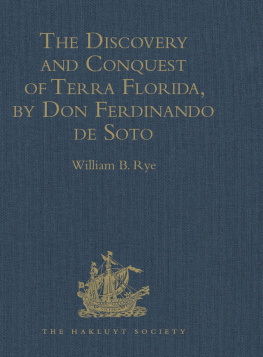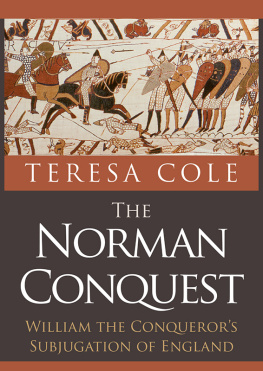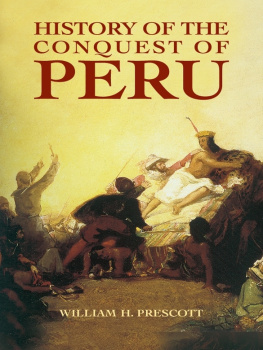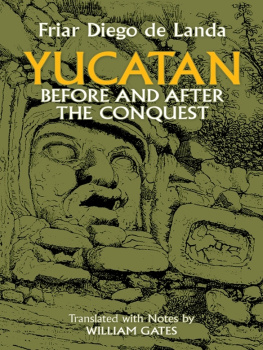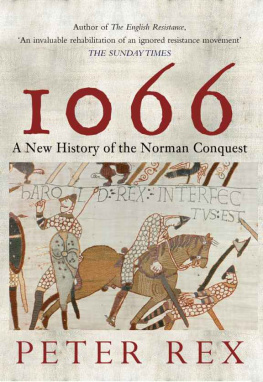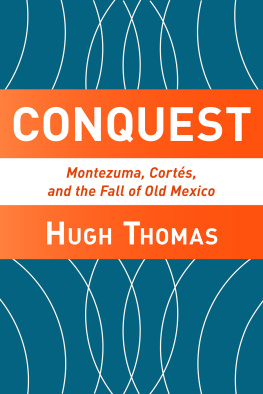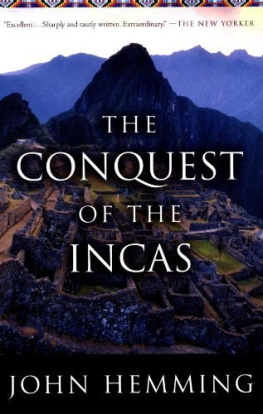William H. Prescott (17561859)
History of the Conquest of Mexico
(1843)
Sir John Elliott is Regius Professor Emeritus of Modern History in the University of Oxford. His many publications on Spain, Europe and the Americas in the Early Modern period include Imperial Spain, 14691716 (1963); The Old World and the New, 14921650 (1970); The Count-Duke of Olivares (1986); and Empires of the Atlantic World , 14921830 (2006). A selection of his essays, Spain and its World, 15001700 , was published in 1989, and a further selection, Spain, Europe and the Wider World, 15001800 appeared in 2009. He was awarded the Wolfson Prize for History in 1986, the Prince of Asturias Prize for the Social Sciences in 1996, and the Balzan Prize for History in 1999. He has received various honours from the Spanish government, and was knighted for his services to history in 1994.
Also in Continuum Histories
Lord Macaulays History of England .
Introduced and selected by John Burrow
J. A. Froudes The Reign of Mary Tudor .
Introduced and selected by Eamon Duffy
Edward Gibbons Decline and Fall of the Roman Empire .
Introduced and selected by Tom Holland (forthcoming)
Thomas Carlyles The French Revolution .
Introduced and selected by Ruth Scurr (forthcoming)
INTRODUCTION
T he year 1859 saw the death of the two most famous historians in the English-speaking world. One was Lord Macaulay. The other was William Hickling Prescott, a Boston gentleman-scholar who had first come to the attention of AngloAmerican readers with his History of the Reign of Ferdinand and Isabella (1838), but sealed his reputation with his History of the Conquest of Mexico (1843), and its companion volume, The History of the Conquest of Peru (1847). On a visit to the British Isles in 1850 he was everywhere fted, and Disraeli, on being introduced to Prescott, opened the conversation by asking: Pray, are you related to the great American author the author of the Spanish Histories? I squeezed his arm, recorded Prescott, telling him that I could not answer for the greatness, but I was the man himself.
Prescotts response was characteristically modest. His fame asthe author of the Spanish Histories, while gratifying, seems to have come to him as something of a surprise. Spanish Histories did not, on the face of it, seem destined to be best-sellers in the AngloAmerican world, and Prescott was well aware of his own limitations as a historian, although he also knew his strengths. But there was something improbable about the way in which this wealthy Bostonian, who might have passed his life in the citys literary circles as no more than a cultivated dilettante, discovered both his vocation and his subject, and went on to achieve international renown.
Born in 1796, the son of a judge who had made a fortune at the Massachusetts Bar, he seemed destined to study in his fathers footsteps and become a successful lawyer. An accident during his second year at Harvard, however, changed the course of his life. He was struck in the left eye by a crust of bread thrown by a fellow student in the dining hall, and lost the use of it. Not long afterwards, an attack of rheumatic fever weakened his other eye and specialists in England, whom he consulted after recuperating in the Azores, told him that there was no chance of effecting a permanent cure. While he could still read, although with difficulty, he was forced to abandon the prospect of a legal career. This does not seem to have greatly dismayed him, and he continued on his European travels in France and Italy. It was apparently the reading of Gibbons autobiography that gave him the idea of becoming a historian, but his poor eyesight would make it difficult for him to read and write without human and mechanical assistance. When he returned home to Boston in 1817 he had with him a noctograph, a frame with brass wires which guided him along the lines as he wrote with a stylus on carbon paper, to which a sheet of ordinary paper was clamped. This device, which he used throughout his life, enabled him to write without having to read the words he had written a task that fell to his unfortunate secretaries.
Marrying in 1820, his first task, if he were to turn himself into a scholar and a historian, was to broaden and deepen his reading, and extend his proficiency in classical and modern languages. But German Gothic print proved too much for his weak eyesight, and in 1824 he decided to learn Spanish as a substitute for German. The entry in the notebooks is characteristic of the man. Making light of his physical difficulty, and struggling against what he believed to be a natural disposition to indolence, he would pursue a rigid self-discipline, spurred on by his determination to live up to the high moral principles inculcated by his Boston background and his Unitarian upbringing.
The effect of his immersion in Spanish literature was to draw him away from his first intention of working on Italian literature and history, and to shift to Spain instead. This led him, in 1826, to choose as a suitable topic for study the relatively unfamiliar Spain of the late fifteenth century and the joint reigns of Ferdinand and Isabella. He began ordering books from Spain, and built up a network of friends and correspondents who, for the rest of his life, would supply him with transcripts of documents from the Spanish archives. When books and transcripts arrived in Boston he would summarize them on his noctograph, and then carefully digest his notes, committing as much as possible of what he had read to his memory. This became so good that he learnt to compose whole chapters in his mind before committing them in their final form to his noctograph. The History of the Reign of Ferdinand and Isabella took ten years to complete, but when it was published at the end of 1837, it was an instant success. Even Prescotts close friends were amazed by the narrative and literary skills displayed in the History, which secured him an international reputation as it found rapidly growing numbers of readers on both sides of the Atlantic.
An account of the conquest of Mexico by Hernn Corts and his fellow conquistadores would have seemed the natural choice for a new project, as the logical continuation of the story of Spains rise to greatness under Ferdinand and Isabella. But for some time Prescott, always drawn by literary history, toyed with the notion of writing a life of Molire, and he acquired from France all the books he needed for the task. The extraordinary success of his Ferdinand and Isabella , however, encouraged him, in his own words, to go on with another subject, which seemed to be a natural continuation of the last, which had the superior advantage of relating to my own quarter of the globe and for which I now possessed eminent advantages for procuring original, unpublished material from Spain Should I be so fortunate as to obtain them, it will give a new and most authentic basis to the history of a series of brilliant adventures, which, from their relation to my own country cannot fail, thus recommended, to have sufficient interest Should I get the materials from Spain, I may produce a work of permanent value.


